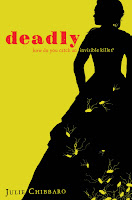Stranger Than Fiction

My curiosity drives me; it always has.
I write fiction, and I base it on real events in history. I do that for two reasons – one, because my favorite thing to do is read, and research involves a lot of reading. And two, because I think reality is often weirder than fiction. I’m horribly curious about the past –what were they thinking when doctors bled a patient, or put leeches on them? What  did they do without antibiotics? What must it have felt like to have people hate you, or not want to live near you because you were a Jew?
did they do without antibiotics? What must it have felt like to have people hate you, or not want to live near you because you were a Jew?
Even though we still have prejudice, and even a simple virus still has no cure, I do believe we can learn from our past. That’s why I write historical novels. To make the past something real and believable because so often it’s not. I read a lot of books to boil down a historical event to one novel, like crushing lots of grapes to make one good bottle of wine. I want readers to get the essence of the way things were, to understand a little better how things ended up as they are now.
I’m doing research for a novel that takes place during World War II, and I’m finding the landscape as dystopian as any dystopian novel. Whole cities bombed to the ground, piles of d ead bodies rotting in the heat, starving families freezing. OK, maybe I’m a little more than morbidly fascinated by how people lived and how they died. That’s what drives me as a historical writer – because what shocks me even more than the stories I read is the fact that people tend to forget those very stories.
ead bodies rotting in the heat, starving families freezing. OK, maybe I’m a little more than morbidly fascinated by how people lived and how they died. That’s what drives me as a historical writer – because what shocks me even more than the stories I read is the fact that people tend to forget those very stories.
 My novel Deadly is based on the true story of Mary Mallon, a woman many people know as “Typhoid Mary.” I started out with my own vague idea of her from childhood rumors growing up in New York City – that she was some kind of killer let loose on society. Of course, the real story was much stranger. She was a cook for wealthy families, but she carried the typhoid bacteria in her body, and spread it (unintentionally) in her cooking. All the families she worked for, and their servants, got very sick, and some of them died. Nobody knew about “healthy carriers” at the time. She didn’t believe she carried the germ, and she refused to stop cooking. She thought everyone hated her because she was Irish. Finally, the police had to take her away, and society locked her up for the rest of her life.
My novel Deadly is based on the true story of Mary Mallon, a woman many people know as “Typhoid Mary.” I started out with my own vague idea of her from childhood rumors growing up in New York City – that she was some kind of killer let loose on society. Of course, the real story was much stranger. She was a cook for wealthy families, but she carried the typhoid bacteria in her body, and spread it (unintentionally) in her cooking. All the families she worked for, and their servants, got very sick, and some of them died. Nobody knew about “healthy carriers” at the time. She didn’t believe she carried the germ, and she refused to stop cooking. She thought everyone hated her because she was Irish. Finally, the police had to take her away, and society locked her up for the rest of her life.
Through my writing, I hope to shed light on the mysteries of our past. If just one reader imagines herself a girl in 1906 hunting down Typhoid Mary, and suddenly sees a person living with HIV (a modern-day healthy carrier) differently, then all that reading and grape crushing will be worth venturing outside the lines.
Very cool. I am fascinated by people who do lots of research into the past!
ReplyDeleteI love your analogy of crushing the grapes of lots of research materials to make one novel, Julie! And your book sounds completely fascinating. Excited to read it!
ReplyDeleteForgot to mention I have been researching a big novel that is going to take a ton of work because it's set mostly in in 1835 Yorkshire. I admire how you are able to juggle all the heavy lifting of writing and research. And squeezing the juice down into something amazing.
ReplyDeleteWow, I really want to read Deadly now! I have great admiration for historical writers and all the research you guys do. And I love how the past can be so fascinating and teach us so much. It's important not to forget history which is why it's important to read historical fiction!
ReplyDeleteSuch a fascinating bit of history, Julie! I add my admiration for those who put vast quantities of research into their novels.
ReplyDeleteAh, I do research obsessively, too, probably as a form of procrastination... but you've put your finger on something key about historical fiction in your last lines... Often imagining these kinds of parallels is what draws me to a story. And ultimately all reading is about building bridges between our own experience and experience that is beyond us. One thing good writers can do is facilitate that connection by making the "foreign" experience present to the reader.
ReplyDeleteI'll have to check out Deadly!
www.ashleyperez.com